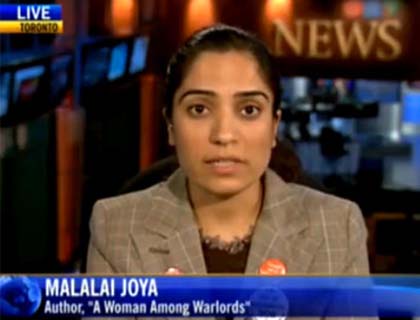I have been an admirer of Joya’s courage and bravery. It was indeed a breakthrough when she raised voice against warlords in the first Loya Jirga after the fall of Taliban. And the way she spoke out needs very strong guts. However, this does not make her “the bravest woman of Afghanistan” and “iconic human rights activist”. We have many of such brave women who have not risen to stardom for some fiery and sensational remarks, but fighting against the suppression and struggling for women rights for decades, even during the war, in Afghanistan. Malalai Joya was unknown on national level in the country before that Loya Jirga remarks. After rising to stardom in Western media, she has been quite irrelevant in Afghanistan in the past couple of years. I was surprised to see her name in the TIME magazine in the 2010 list of the “Most Influential People in the World” and Foreign Policy Magazine’s list of “Top 100 Global Thinkers.” Recently the Guardian had placed her in such a list on Women’s Day. There are far more deserving, but not attention-seeking, women activists in Afghanistan, who have served their entire life struggling against warlords and for women rights. A single example is Dr. Sima Samar, who has dedicated her life educating Afghan girls and fighting for their rights in the last 30 years, but never with attention-seeking attempts to make it in any of the top lists of Western media outlets. Similarly, there are hundreds of brave Afghan women struggling across the country in many walks of life nowadays. You might accuse me of any personal dislike and prejudice towards Joya, but recently I read two of the best commentaries on Joya written by Afghan women! The one below I am quoting is written by Noor Jahan Akbar. She explains the reason which I always wonder, why Joya gets so much attention. “The majority of the people I meet in United States of America are unaware of most of the things going on in Afghanistan, which is why bold statements like that of Malalai Joya’s are taken at a face-value and herself as the representative of Afghan women. After her speeches little thought is put into doing research about how much truth they carry and even less time and patience is put into checking whether she has the credentials or the support of Afghan women to be their representative in the world.”
Noor Jahan continues,
“unlike Ms. Joya, the majority of Afghan women fear the exit of foreign troops from Afghanistan for valid reasons. The Taliban regime was not only harsh and inhumane towards women, but also men, and also religious monitories or anyone who dared to question their authority. They enforced humiliating and inhumane punishments and took many lives and livelihoods in Afghanistan. Not only the educated elite, as it is sometimes imagined in West, but ordinary Afghans across the country suffered in their hands. I am not claiming Ms. Joya supports Taliban, but her emphasis on troops’ exit makes it seem like she has little care for the consequences of an abrupt exit for millions of Afghans who still have faith in international community’s commitment to Afghanistan. Afghan women, especially the 43% of Afghan girls in schools, the women who make 30% of university students, the women who make 29% of the teachers, the women who represent 28% of the National Assembly, the women who produce 7.5% of contractual services for the Afghan government, and the hundreds of women in shelters and those who work at civil services organizations, are well aware of the horrific impacts of the withdrawal of [foreign] troops from Afghanistan and would not support Joya’s stand on this subject. Hence, Malalai Joya is not the representative of Afghan women in the world.”
Noor Jahan Akbar rightly criticizes Malalai Joya’s lack of alternative:
“Given the weakness of the central government and the Afghan National Army, it is clear that power will lend itself to either the Taliban or the warlords or a coalition of both after the foreign troops exit the country. Ms. Joya has no clear idea of how she and others who advocate for disengagement of foreign troops in Afghanistan will be able to provide any security to the people of Afghanistan or guarantee any rights to Afghan women if the troops should exit.”
Who else better than an Afghan woman like Noor Jahan can tell who the bravest women of Afghanistan are?
”the bravest women of Afghanistan are the 23 women who recently graduated as officers for the army, the 150 women who work 10 hours a day on a saffron field in Herat, the hundreds of women who sing songs of protest everyday in their houses to remind their daughters of how much courage it takes to live as a woman in Afghanistan and the tens of women who are sexually, verbally and physically abused everyday in prisons. The bravest woman of Afghanistan is Sakeena Yaqubi who has built a school and a learning institute, or Pashtun Begum, who was a beggar and now provides small business opportunities for other widows. A woman who has lent her voice to politicians might be brave but is neither my representative nor the bravest woman of Afghanistan.”
Like Noor Jahan, there are many Afghan women who don’t consider Malalai Joya their “champion” as dubbed by Western media. Recently another Afghan woman, Nushin Arbabzada, wrote on Guardian about the anti-US rants of Joya. “without the international community’s interference, there would not have been the 2003 Loya Jerga where she [Joya] first gained international fame. Joya’s anti-US military rhetoric resonates with the leftist circles of the west who are her chief audience.” Nushin’s piece on Guardian explains the political reasons of Joya’s irrelevant “activism” in Afghanistan being used by a group of radical leftist Afghans against their rightwing Islamist rivals.

